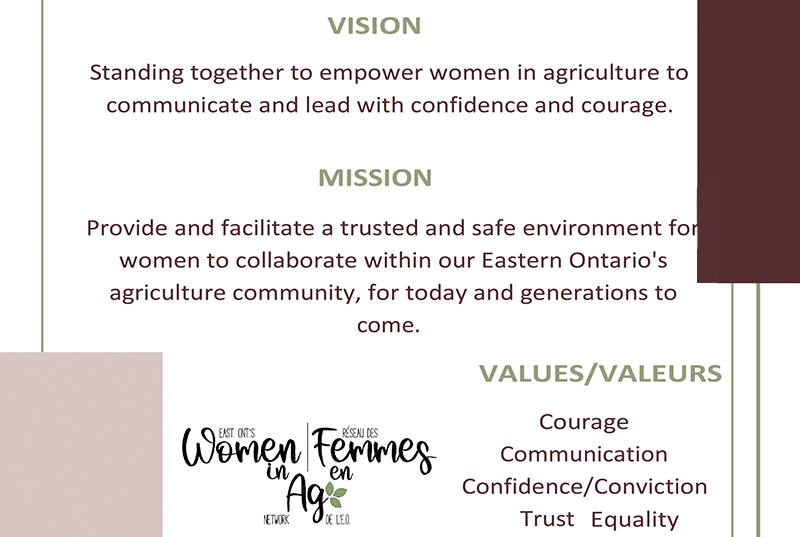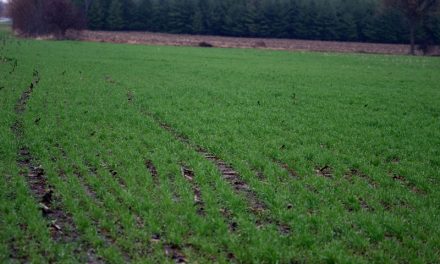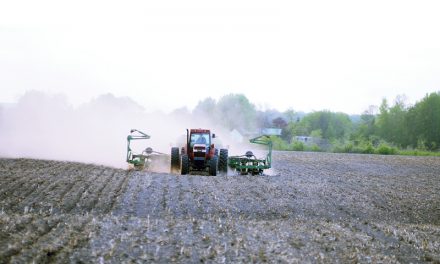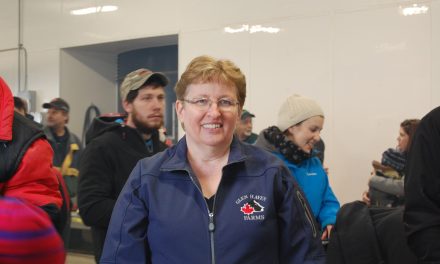By Vicki Brisson
President of Eastern Ontarios Women in Ag Network
The future of agriculture — a place for everyone, regardless of area of expertise, race or gender! We still have a lot of work to do to achieve this idealistic goal, but it’s the vision that motivates me as I begin my career in this stimulating, rewarding and fulfilling field!
All the women in agriculture that I have been fortunate enough to work with over the years have all, in their own way, enabled me to become the young woman I am today. It is for this reason that in January 2021, I launched the Eastern Ontario’s Women in Agriculture Network. This bilingual network provides a community of support, encouragement and inspiration for women in agriculture of all ages and backgrounds.
The agriculture industry faces many unique challenges, as it involves less than 2 per cent of the Canadian population, but it is essential to providing quality products to all Canadians. Over the past year, through my personal experiences, my role with The Canadian Agricultural Youth Council, my many discussions with other women in the field, and the numerous studies conducted on the subject, I have been able to reflect on how we might address the challenges faced by women, but that also apply to other diverse groups. These key challenges are as follows:
A Lack of Diversity and Representation
Very often, when we think of agriculture, we imagine the classic image of a white man in a field. Our industry has certainly made great progress over the years. In fact, it is important to celebrate the fact that the majority of graduates from agricultural faculties and related fields of study are women. In addition, exceptional women, such as the Honourable Marie-Claude Bibeau, federal Minister of Agriculture and Agri-Food, and Peggy Brekveld, president of the Ontario Federation of Agriculture (OFA), are taking their place in leadership roles.
However, we must not stop there. A study conducted by the OFA in 2020 indicated that 67 per cent of women farmers had been victims of disrespect because of their gender. In addition, a study conducted by the Canadian Agricultural Human Resource Council (CAHRC) indicates that women still occupy a minority (25 per cent) of management roles compared to their male colleagues (75 per cent). Such inequalities can discourage both girls and women in agriculture from pursuing careers in the industry. We need to work together to encourage all women to speak out in a secure environment where they can discover and improve the skills they possess so that they too can sit on administrative boards, at decision-making tables, or in management roles in large agricultural companies.
In addition, collaboration with organizations can support women in agriculture to enable them to achieve equity in this area where men’s voices still dominate. In Eastern Ontario, the women’s leadership known as Leadership féminin Prescott-Russell (LFPR) has already launched initiatives for the governance and youth leadership for women called Gouvernance au féminin and Leadership jeunesse au féminin, respectively.
Access to Resources
This challenge is complex and is directed at both women farmers and consumers. The language barriers faced by Francophone women farmers are considerable. Many resources are available to our English-speaking colleagues, but the limited or non-existent availability of French-language resources often exacerbates our sense of isolation. The holding of the first-ever Women in Agriculture Leadership Symposium, organized by l’Union des cultivateurs franco-ontariens (UCFO) on March 26, 2021, with LFPR as the lead partner, demonstrates that this need is recognized by the industry. This unique event will certainly offer resources and an opportunity for exchanges between them that will be appreciated by Franco-Ontarian women in agriculture. Although these initiatives are still in their infancy, they respond to a growing need, and other large agricultural organizations should take them as an example in order to offer equitable services to all their clients.
If access to resources is an issue for those already involved in agriculture, we must also consider the impact this can have on the future of our industry. In order to ensure the next generation of farmers in all agricultural sectors, it is important that young girls be able to consider the opportunities available to them in this field when considering their future careers. Too few Canadians understand where their food comes from and the career options available to them in the field. It is therefore important to integrate agriculture into school curricula to allow students to consider the many ways in which they can thrive if they choose to pursue a career in agriculture.
As women in agriculture, we often try to measure ourselves against men by creating an “armour” under which we try to hide our “shortcomings”. While it is crucial that we make our mark, I would like to reiterate that it is important that we instead use our strengths to bring a new perspective to the industry and its many challenges, such as those mentioned above. The diversity of ideas, experience and skills will be the key to success in ensuring the prosperity of our Canadian agricultural industry.













